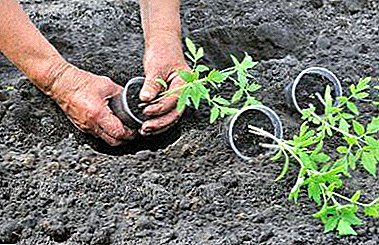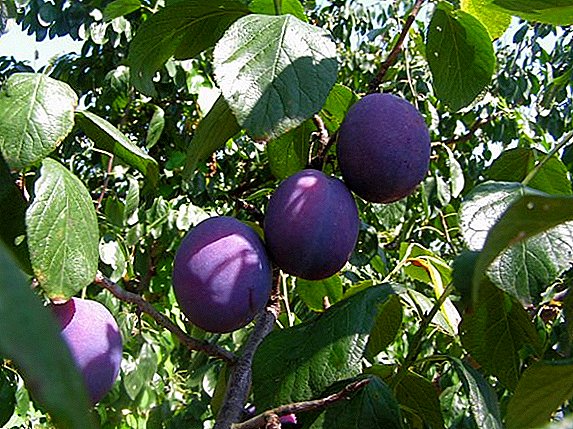 Each poultry farmer knows that chickens can manifest various problems with the gastrointestinal tract and dermis (the connecting part of the skin), which negatively affects the growth and survival of the livestock. To combat these ailments developed many modern expensive drugs. However, domestic breeders very often prefer "Iodinol", which is relatively inexpensive, has proven effectiveness and does not require special skills during therapy. In this article we will talk in detail about this drug.
Each poultry farmer knows that chickens can manifest various problems with the gastrointestinal tract and dermis (the connecting part of the skin), which negatively affects the growth and survival of the livestock. To combat these ailments developed many modern expensive drugs. However, domestic breeders very often prefer "Iodinol", which is relatively inexpensive, has proven effectiveness and does not require special skills during therapy. In this article we will talk in detail about this drug.
Pharmacology
In the people, this substance is often called blue iodine. There is no international non-proprietary name. The drug is safe to use, because it does not contain toxic compounds, antibiotics, vaccines, hormones and other substances, released strictly on prescription.
In the composition of "Iodinol" there are such substances (per 1000 cm ³):
- iodine - 1 g;
- polyvinyl alcohol - 9 g;
- potassium iodide - 3 g;
- purified water (as solvent) - the remaining volume (approximately 980-990 g per 1000 cm³).
Important! When working with "Iodinol" Wear protective gloves and a bathrobe.The drug has a characteristic iodine odor. With a mechanical effect on it begins to foam.

Learn how to treat and prevent chickens' diseases.
It belongs to the pharmacological group of antiseptics. The main active ingredient is iodine, which when in contact with the epidermis has a resorptive effect:
- takes an active part in metabolic processes;
- when combined with L-tyrosine, it produces thyroxin, an important thyroid hormone, whose main function is to activate metabolic processes;
- accelerates the processes of decomposition of complex organic compounds;
- takes part in the breakdown of various proteins.
Did you know? "Iodinol" first began to use during the Second World War (1942). At that time, this remedy helped to heal mechanical skin wounds, preventing the spread of infection with blood through the tissues and organs.
 If the intestines of chickens are affected by bacterial microorganisms, then “Iodinol” can actively counteract them. Moreover, this drug shows high activity in the fight against both gram-positive and gram-negative strains.
If the intestines of chickens are affected by bacterial microorganisms, then “Iodinol” can actively counteract them. Moreover, this drug shows high activity in the fight against both gram-positive and gram-negative strains.
What is intended for
"Iodinol" is intended for the treatment of gastrointestinal problems, washing the nasopharynx, treatment of secondary dermatological infections and diseases of the genitourinary system. Veterinarians often use blue iodine to treat coccidiosis and pullorosis in chickens. "Iodinol" is also used as a prophylactic agent at risk of developing vitamin deficiencies (especially in winter, when greens are absent from the poultry diet).
For the treatment of coccidiosis in chickens use drugs such as Amprolium and Baycox.
In surgery, with various surgical interventions, "Iodinol" is used in a concentrated form. The drug has also found its use in the treatment of otitis, catarrhal and catarrhal-purulent vestibulitis.
How to apply
"Iodinol" is a biologically active substance that effectively suppresses bacterial flora. Dosage means will depend on the weight of the chicken and the type of therapy (the disease that needs to be cured). 
We recommend to learn how and how to feed the chickens in the first days of life.
The drug is used as follows:
- For the treatment of skin diseases caused by pathological microorganisms, as well as for the rapid healing of injuries and mechanical wounds, the drug is used in a concentrated form. Iodine is applied to a cotton swab, after which the affected areas of the skin are carefully treated.
- Pullorosis is treated with "Iodinol" diluted in water in proportions of 1: 0.5. The drug is given to chickens 3 times a day with 0.5 ml. The course of treatment lasts 8-10 days. If necessary, therapy is repeated after 7 days.
- In coccidiosis, the drug must be diluted with water in the same proportions as we indicated above. Usually the treatment lasts 7 days. Dosages depend on the age of the chickens: birds up to 4 months should be given 0.5 ml of iodine three times a day, adults should be twice the dosage.
- The drug also proved to be an effective prophylactic during autumn-winter infectious epidemics. It is used at risk of developing avitaminosis. In order to prevent "Iodinol" give diluted in water (standard proportions) 1 time per day for 15 days. If necessary, repeat the course after a week.
Important! "Iodinol" incompatible with silver water and water solution of potassium permanganate.
This drug is absolutely non-toxic, so meat and egg products after its use can be safely eaten. "Iodinol" in a very short time is metabolized in the liver and excreted from the body, not accumulating in tissues and organs.
VIDEO: THE APPLICATION OF IODINOL FOR A BIRD
Contraindications and side effects
If you do not comply with the indicated dosage and use during therapy much more drug, then there may be a rash in places where iodine is applied. In addition, allergic reactions in the form of skin rashes can occur with individual intolerance of iodine. "Iodinol" is well combined with other drugs, including antiseptics.
Poultry owners will be interested to know what needs to be done in order for as many chickens as possible to grow to adulthood.
The main contraindications for use include: dermatitis herpetiformis, and thyrotoxicosis. In most cases, "Iodinol" does not cause side effects. There were no cases of addiction.
Precautionary measures
Rules for working with the drug and the main precautions are as follows:
- getting "Iodinol" on the mucous membrane of the eyes is unacceptable, in this case, you need an emergency eye wash under clean running water, it is best to go to a medical institution after self-washing;
- while working with "Yodinol" it is strictly forbidden to smoke, drink, eat food, talk on the phone and be distracted, after working with the drug it is recommended to thoroughly wash your hands with soap and water;
- unused aqueous solution of blue iodine must be disposed of (long storage is contraindicated);
- use of "Iodinol" with other antiseptics is prohibited;
- it is necessary to store the drug at temperatures from +3 to +30 ° C, in a dark place where there is no access for children and animals, in such conditions the drug (in its clogged form) can be stored for no more than three years;
- It is forbidden to store the substance at a temperature of more than +40 ° C, since high temperatures contribute to the decomposition of the active substance "Iodinol"
- after the expiration date of the drug must be disposed of in accordance with the rules established by law.
Did you know? Invented "Iodinol" an outstanding domestic physician and chemist, Doctor of Biological Sciences V.O. Mokhnach.
 Finally, I would like to note that bacterial microorganisms do not produce immune resistance to blue iodine, so this drug can be reused many times. It is because of this property, but also because of its high efficiency and low price, "Iodinol" is very popular in veterinary medicine.
Finally, I would like to note that bacterial microorganisms do not produce immune resistance to blue iodine, so this drug can be reused many times. It is because of this property, but also because of its high efficiency and low price, "Iodinol" is very popular in veterinary medicine.
Reviews














